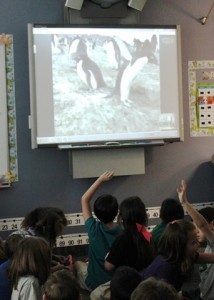NSU Newsroom
SharkBytes
Horizons
This version of NSU News has been archived as of February 28, 2019. To search through archived articles, visit nova.edu/search. To access the new version of NSU News, visit news.nova.edu.
This version of SharkBytes has been archived as of February 28, 2019. To search through archived articles, visit nova.edu/search. To access the new version of SharkBytes, visit sharkbytes.nova.edu.
University School Students Study Penguins in the Wild
The University School Lower School Environmental Science curriculum covers how the natural world works and how we as humans interact with and affect the environment. Students are currently engaged in a unit on penguins that includes locating the Polar Regions on a world map to identify where in the world penguins live. Students are learning that all known species of penguins live naturally in the southern hemisphere, but of the 17 penguin species, only two, the Emperor and Adélie, can be found on the frozen Antarctica continent.
Among the books our younger learners are reading are The Emperor’s Chick, by Martin Jenkins, and Mother’s Journey, by Sandra Markle. Students will also examine pictures and videos of the Emperor and the Adélie penguins, identify and list the anatomy and characteristics of penguins, and add terms related to penguins and Antarctica to their vocabulary. Studying the climate, the various types of precipitation, and the types of animals that live in Antarctica are also part of the learning experience. Yet, most exciting is discussing what it would be like to live in the Polar Regions.
Second grade students also had the extraordinary opportunity to participate in a live video chat with Jean Pennycook, researcher who studies Adélie penguin life, history, and their relationship to climate change. The Skype conference took place from the penguin breeding colony in Cape Royds on Ross Island, Antarctica. University School students not only listened to Pennycook explain how these amazing birds cope with the harsh environment of Antarctica, they actually saw the penguins in their natural habitat. The video conference concluded with Pennycook answering questions from our young learners, which included questions such as, “How long can Adélie penguins hold their breath?”, “How long do Adélie penguins live?”, “Do Adélie penguins have predators?”, and “Does Antarctica have a flag?”
For more information about University School, please call (954) 262-4506 or visit us online at www.uschool.nova.edu/admissions.
